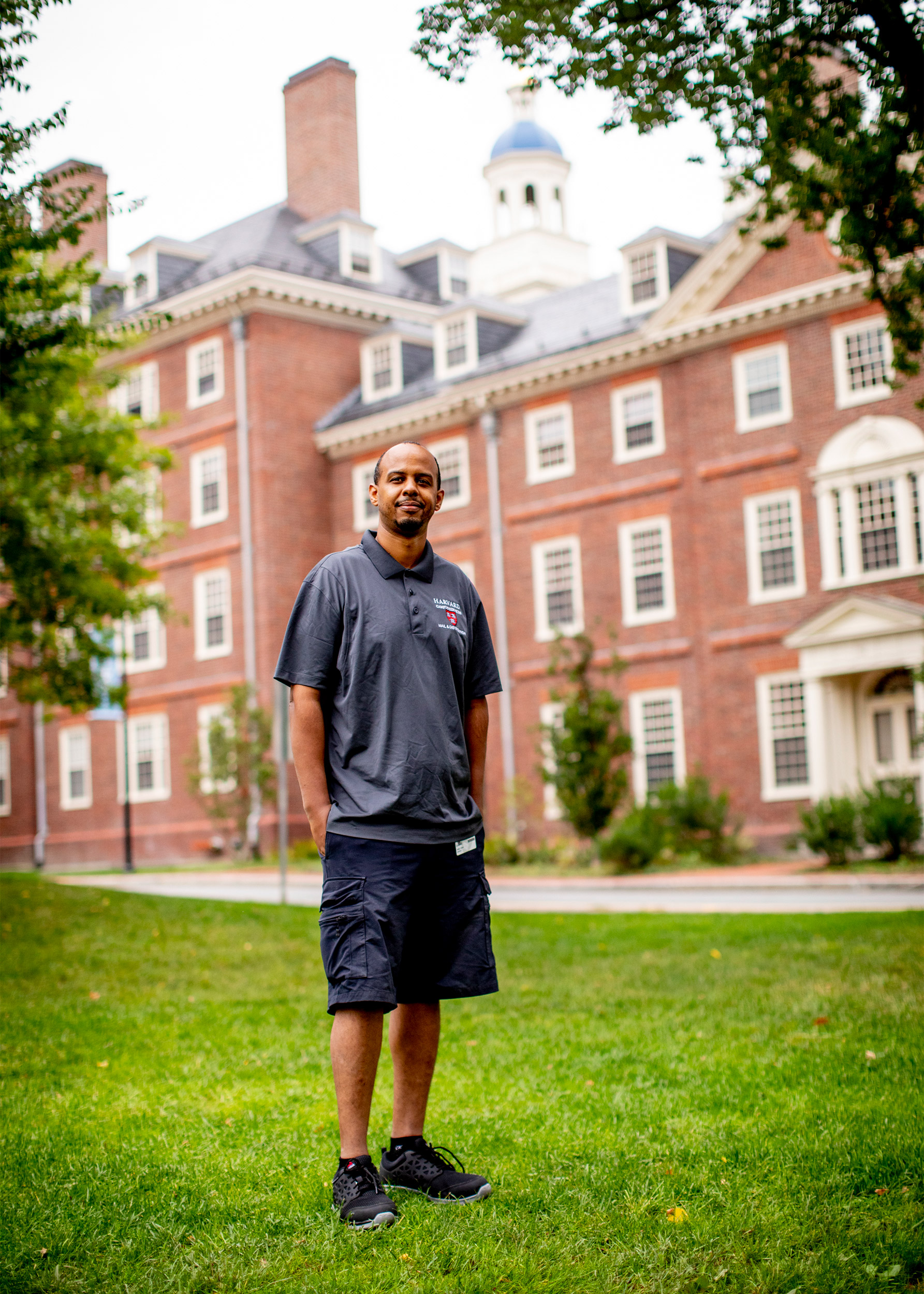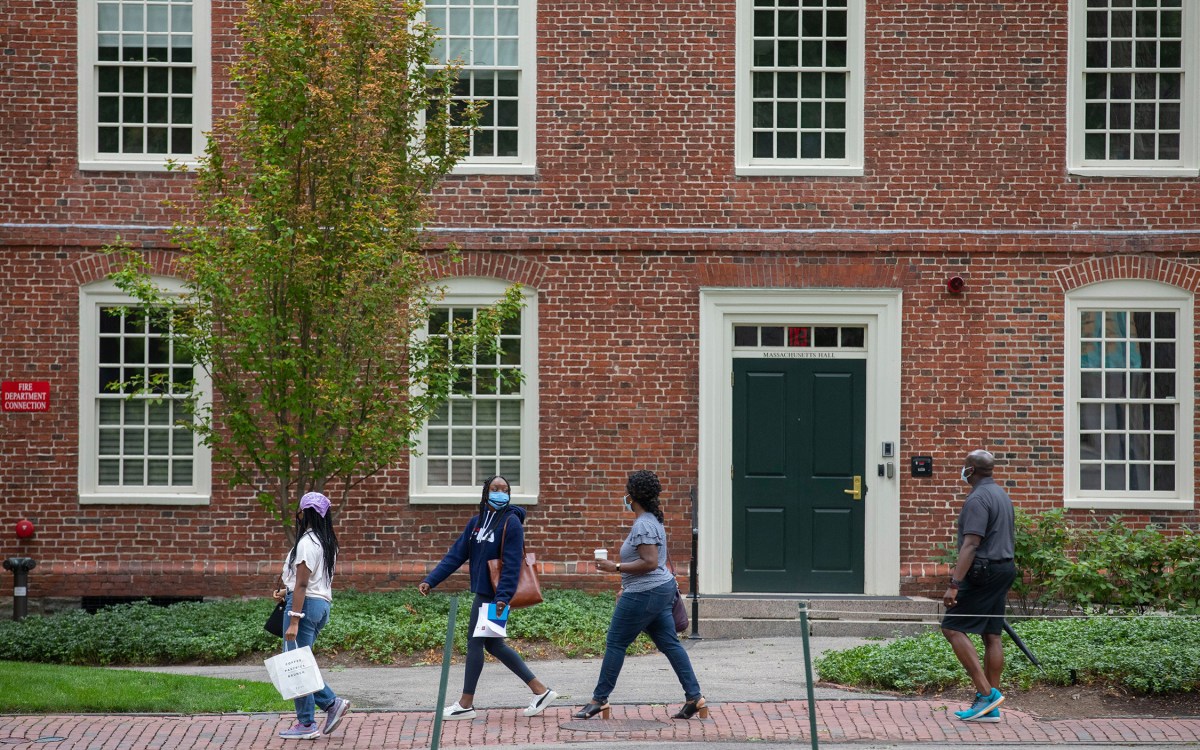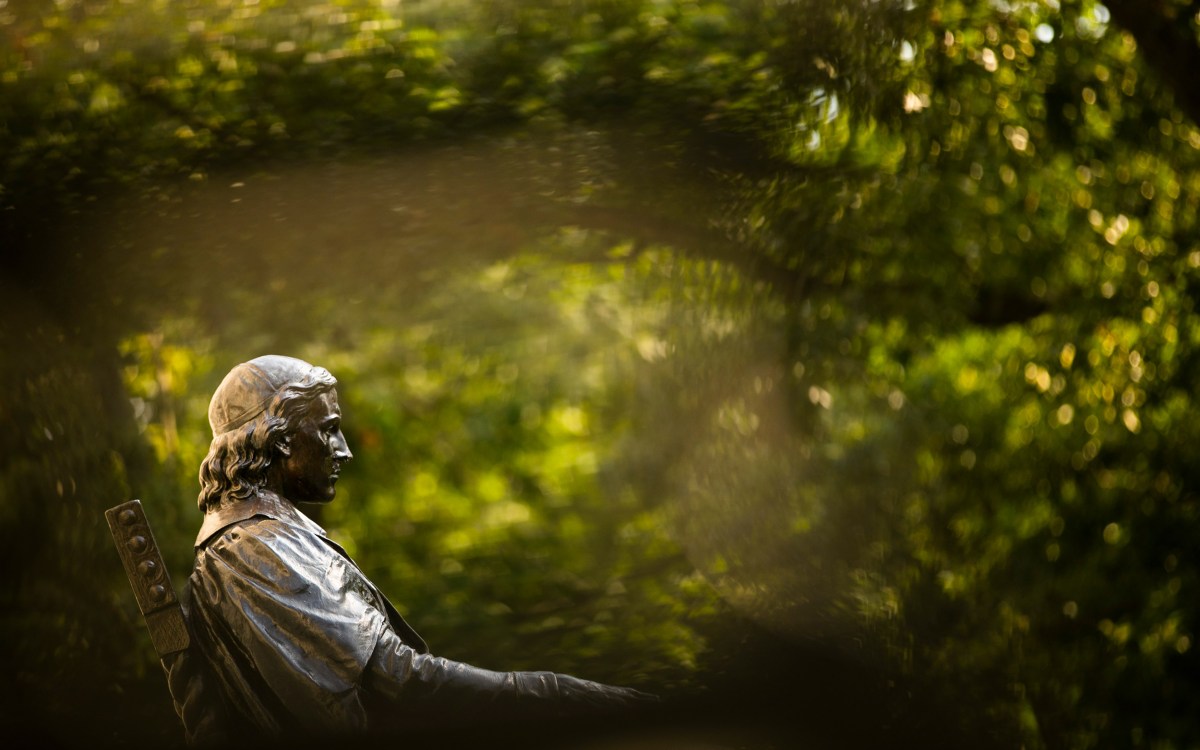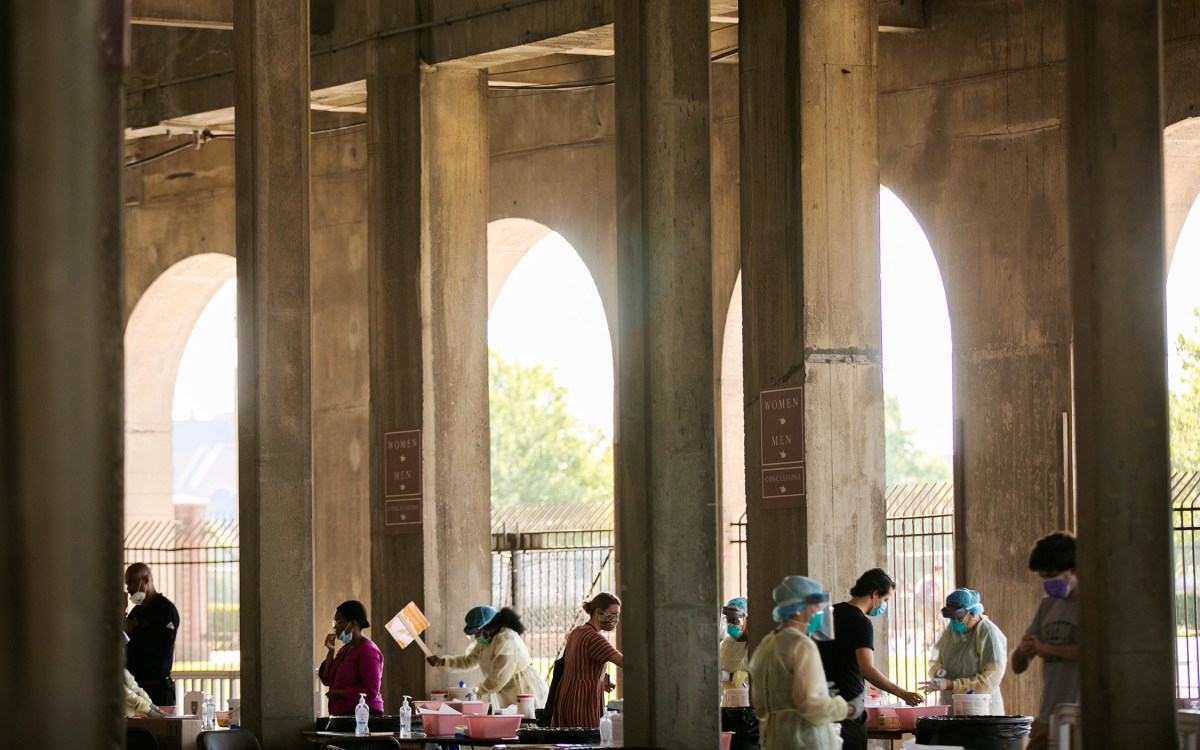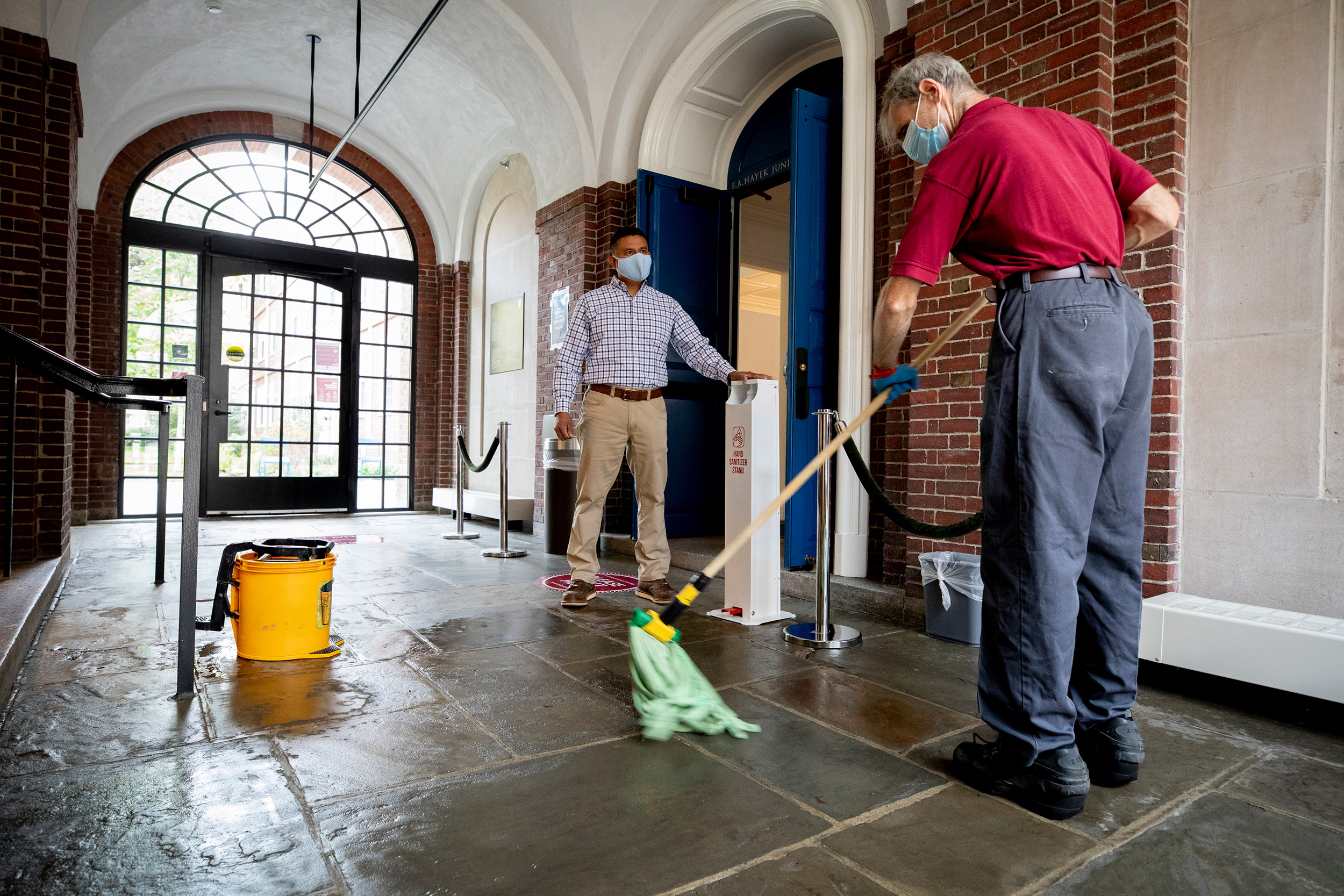
Harvard custodial manager Elson Callejas (left), who led the distribution of “cleaning kits” to 1,200 students moving onto campus, is shown in Lowell House with worker James Normile.
Photos by Rose Lincoln/Harvard Staff Photographer
Work that is vital, workers who are essential
Creating a safe, healthy campus takes teamwork, elbow grease, and human concern
Almost everybody left campus in the spring after University officials ordered students, faculty, and staff to evacuate as the coronavirus pandemic swept the country. But there were some who needed to stay. Custodians and building managers kept coming in to make sure offices, classrooms, and other facilities remained operational, and key administrative staff were needed to set up guidelines, with the help of University scientists and experts, to ensure campus would be safe to reoccupy in fall.
Maintenance workers spent weeks disinfecting buildings, closing down common areas, and removing furniture as part of a plan to de-densify Houses and labs. Plumbers installed touchless faucets and hand sanitizer dispensers across campus, and heating and air conditioning mechanics installed special filters to improve indoor air quality while some administrative staffers worked the phones and computers to purchase face masks, protective equipment, and COVID-19 test kits.
All had essential tasks to perform. After the University reopened, others assumed jobs on the front lines. Cooks began preparing nutritious and healthy meals for around 1,600 students on campus, most of them first-years. Mail carriers added delivering masks and test kits to their duties. Custodians slammed into high gear to keep heavily trafficked areas and surfaces disinfected.
The Gazette interviewed eight frontline workers. The interviews were conducted between August and October and have been condensed and edited.
Alixis Sanchez
Custodian
I have been working at Harvard for 21 years. Before the pandemic, my job as a custodian at Kirkland House was to clean the House’s common areas, the hallways, the dining hall, and the dorms’ bathrooms.
After the pandemic, my job changed dramatically. Now I can’t go inside the students’ dorms bathrooms for safety reasons. I clean the bathrooms in the dining hall, but most of my work is devoted to disinfecting surfaces and areas that people often touch, such as doorknobs, switches, stair handrails, etc., in all five floors of the house. Now all the housekeepers have to clean those areas every hour to make sure that everybody remains safe and healthy. Sometimes, I have to work in other Houses; everybody has to chip in to help.
What I miss the most is talking to the students. Before the pandemic, they’d talk to me, and I’d talk to them, and we’d have nice chats in the hallways, the yard, and around the House. Now the House is more silent and feels lonelier. Everybody has to be more careful now; we can’t have any close contact with students. I also miss doing cleaning because when you clean, you can see the results of your work. I’d clean as if it were my house. But disinfecting is important for the sake of students, but also for everybody’s, including me and my family.
The University has very careful protocols to keep everybody safe and healthy. They have thought of everything. There are hand sanitizers, masks, and wipes wherever you turn. I just pray for everything to be back to normal soon. I hope that we can go back to the routines we had before the pandemic and be able to see all the students back on campus.
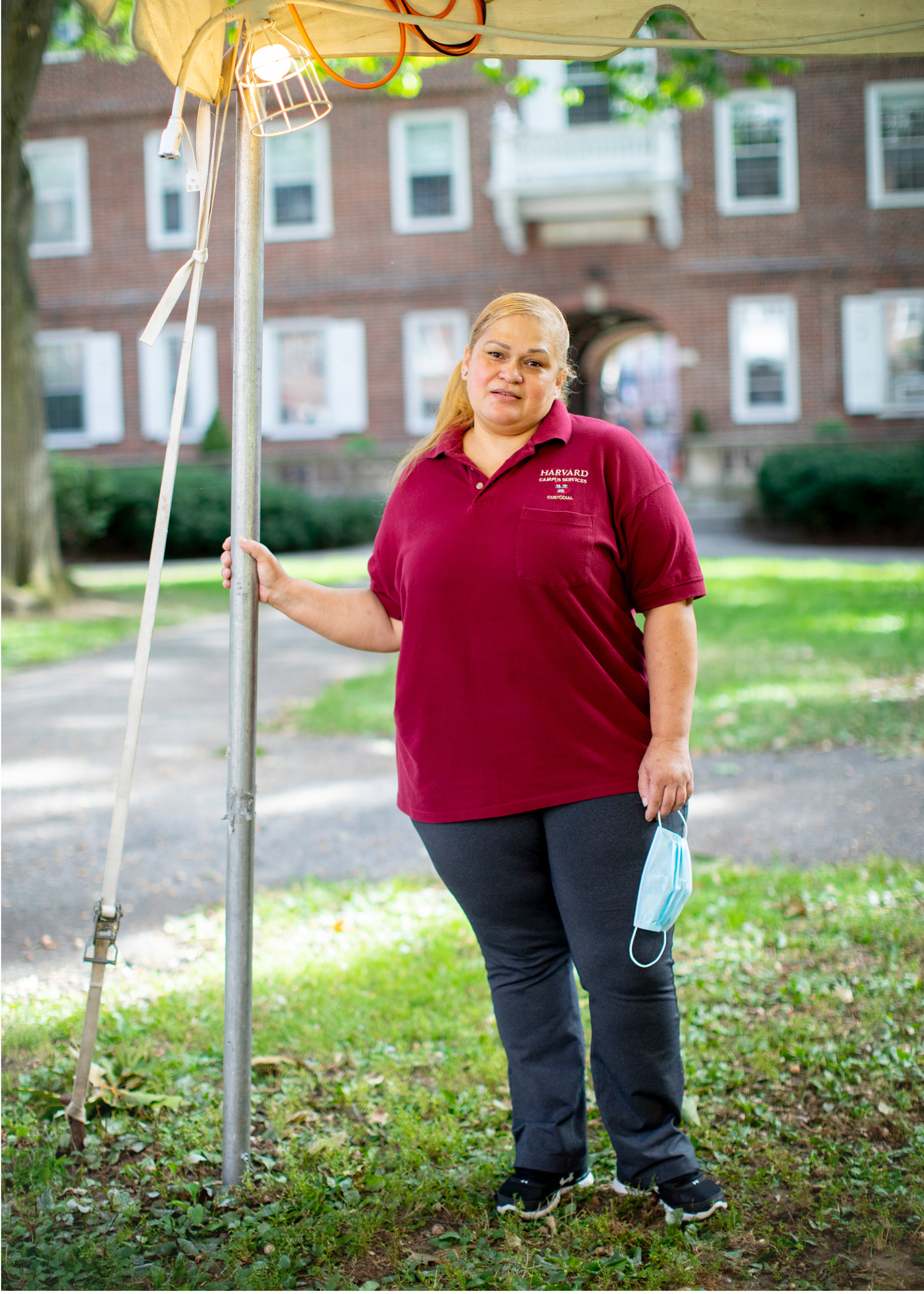
David Abreu
Licensed Plumber
I’ve been at Harvard just over five years. I work in the river dormitory area, which includes nine upperclassmen Houses along the Charles River, athletics, and the Harvard Kennedy School. Before the pandemic, my job was mostly dealing with any plumbing issues in the dorms — anything from leaks, running toilets, clogged drains, or broken pipes. All the typical plumbing issues. On any given week, we would get between five to 10 calls. It was busy and hectic.
With the pandemic, our work changed a bit, but we never stopped working. We had to take care of all the buildings, flushing them regularly because of concerns over Legionella bacteria, which builds up in the water when buildings sit empty for months, and can cause Legionnaires’ disease. We installed well over 100 touchless faucets in dorms and bathrooms throughout the campus, changed filters in drinking fountains, and modified them with sensor-activated water-bottle fillers. That took a lot of work.
When students came back, we were back to our regular work. But the way we go into a room is a lot different now. We’re wearing masks and face shields and keep a 6-foot distance from the occupants in the room. Trying to keep everyone safe and getting the work done is challenging.
Before the pandemic, it was nice to meet people and see the students walking around. That was the most exciting thing because clearing drains and making repairs is not too exciting. And the kids are a lot happier when you fix things. They’re very appreciative. It’s nice to be able to help them even with the smallest stuff. We’re hoping there is not a big uptick, and they will come up with a vaccine to get all the students back. They’re the reason why we are here.
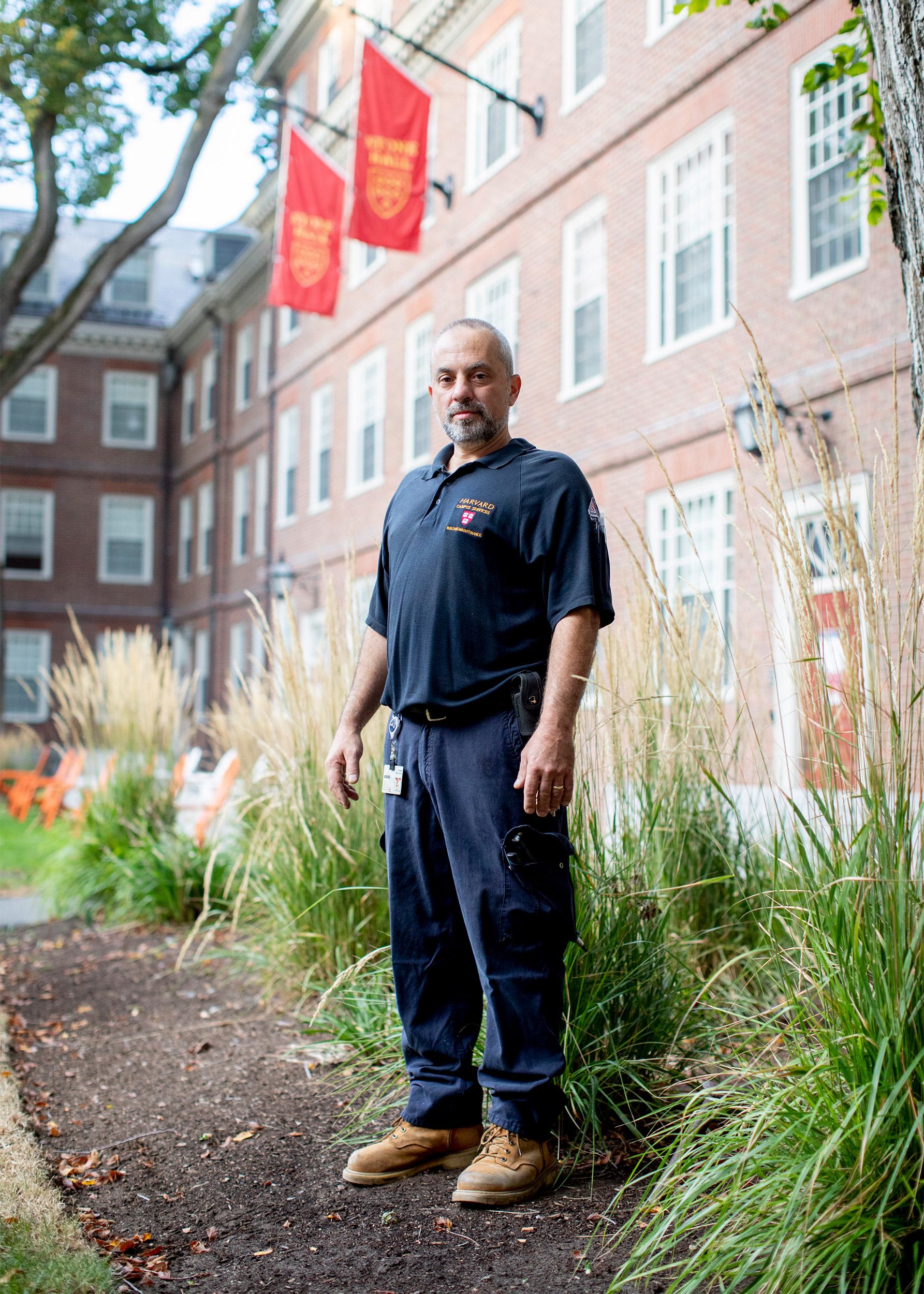
Arlene Richburg
Executive Chef
I’ve been at Harvard 11 years. Before the pandemic, I was working at Sebastian’s Café, which is the caterer and the café at the T.H. Chan School of Public Health. My job involved preparing meals, writing menus, ordering food, coordinating events, meeting with clients, and setting up events.
Sebastian’s Café is closed during COVID-19. I’m at Leverett House now. I’m still preparing nutritious and delicious meals for the students, and I’m working with the cooks and the staff to put out healthy meals every day. Work is a bit different now. We’re serving about 100 students three times a day. We were used to preparing the food and serving it as the students came in. We still season, marinate, grill, bake, roast, steam, but now we put everything into food boxes so students can take their meals to their rooms and heat them up in the microwave. We strive to give them something that even though it’s packaged still has crunch and texture, so it’s not a sappy meal. The piece that is different is the safety of the food. We cook the meals; we cool it down; then we package it and keep it at the right temperature because we don’t want to have any kind of foodborne outbreak.
The best part of the job is to do our part to offer healthy and delicious meals. The team of chefs does a phenomenal job, as well as the crew of cooks, servers, and dishwashers. It’s nice to see everybody working together. The challenging part is to not be able to socialize as we eat. Food brings compassion, love, and sweet things that I think we need so much more of right now. It brings people together, but at this time, it’s not safe to eat together. We want to make sure that everybody is doing what they need to do to stay safe.
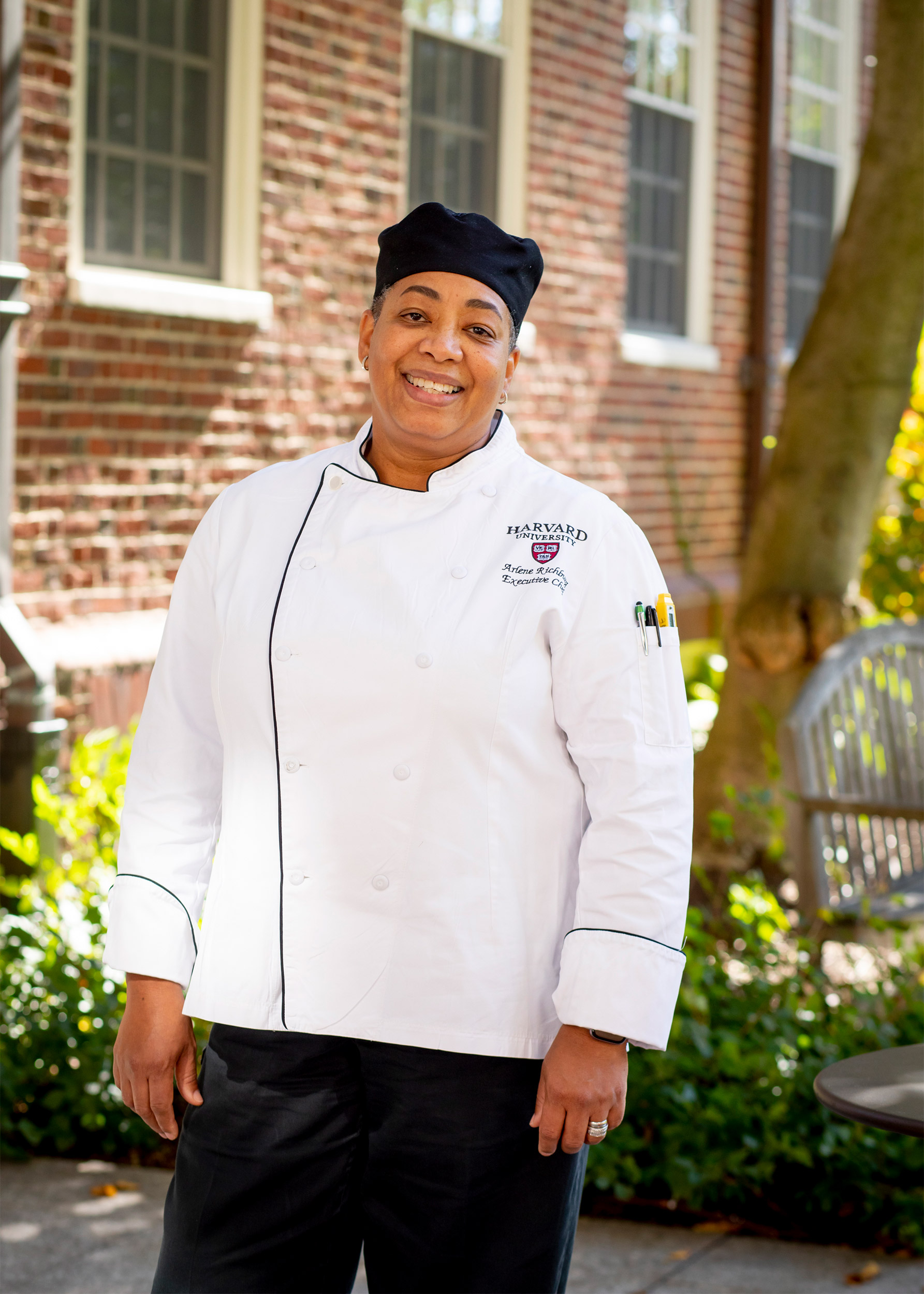
Elson Callejas
Custodial Manager
I’ve been at Harvard for almost 15 years. I started as a custodian at the Malkin Athletic Center, and now as a custodial manager, I have 63 custodians who report to me. My job is to provide a service that makes students and the entire community feel safe, comfortable, and healthy. Before the pandemic, part of my work was to visit the different buildings that make up my portfolio, from the River Houses to the Science Center, to check the hallways, the classrooms, the bathrooms, and make sure everything was clean and complied with our regulations.
I’m from Guatemala, where I was a primary school teacher. I came to the United States 20 years ago, and in the beginning I worked in construction. Working at Harvard is different. Everybody who works here is a member of the community. We’re like a big family, and we all try to help and take care of each other.
Most custodians kept working during the pandemic. We helped students move out when the evacuation order came, and we cleaned and disinfected every single room in the Houses after they left. Working during the pandemic has been challenging. Custodians can’t work from home. One of the big jobs we had was preparing cleaning kits with cleaning supplies for students who were coming back in the fall. We deployed over 1,200 kits for students to clean their bathrooms for social distancing and safety reasons. We’re focusing on disinfecting all high-traffic and common areas. We’re prepared for outbreaks because we have to be prepared for anything, but we hope we don’t have to use any of that. I feel grateful for my team and the support of the University administration. My hope is that students and the entire community stay healthy. Custodians are working hard to do their part.
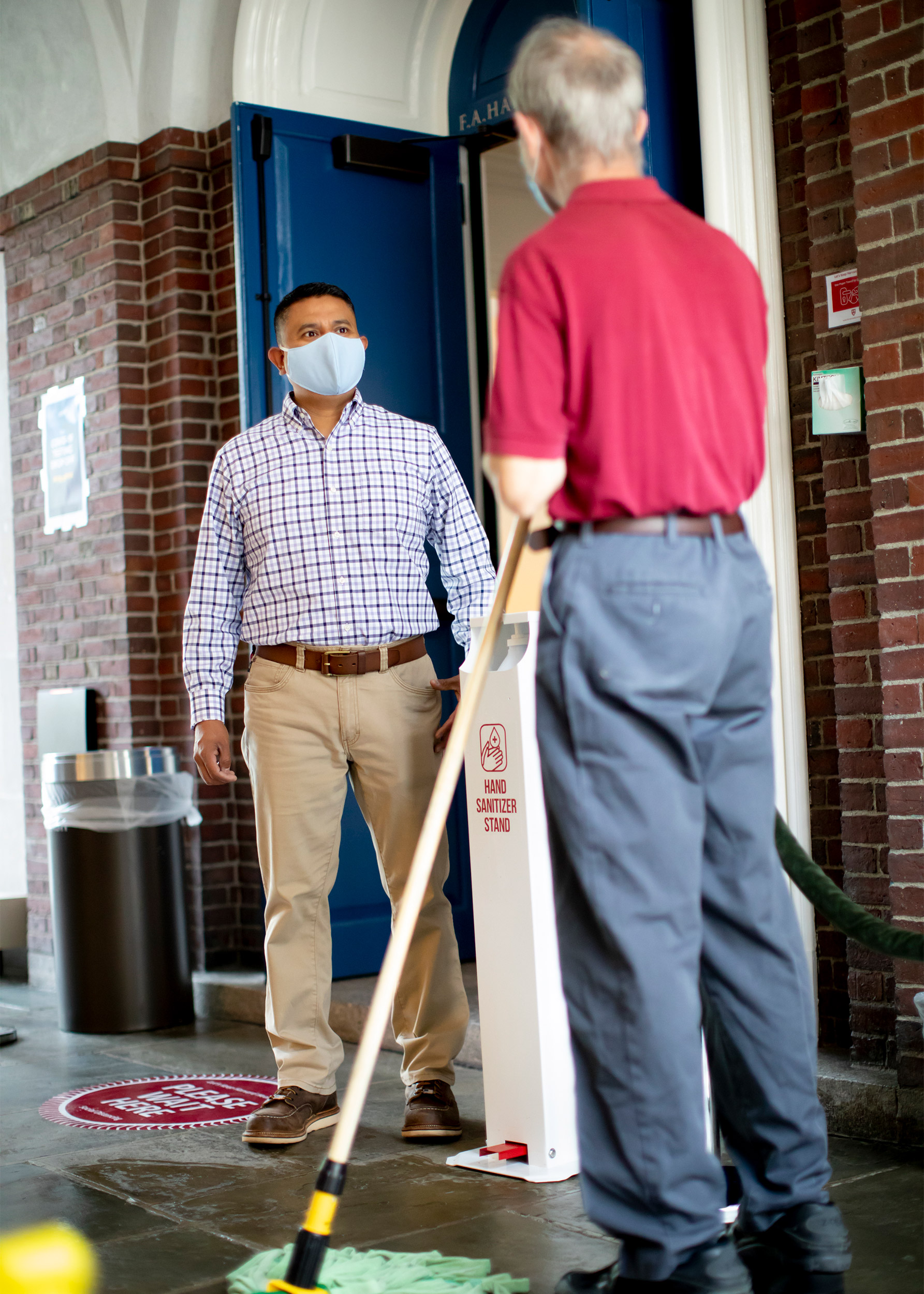
Jennifer DeSutter
Building Manager, Linden St. Art Studios and the Carpenter Center for Visual Arts
I got here in November 2018. Before the pandemic, my job was to help the people in my two buildings have what they needed to create art and beautiful messes. Much of what a building manager does for the occupants is almost invisible. If you’re doing your job correctly, they don’t know you’re doing it. Everything is both mundane and enormous.
When the pandemic hit, the building manager community closed ranks. Everybody jumped in; everybody helped. Committees were formed to try to procure hand sanitizers and where to place them and how to produce information and signage tools for the buildings’ occupants. We created a procurement team to work on getting things, depending on what was needed. In the early stages of the pandemic, what we did as building managers was to look at all of our buildings and make sure they were functioning. As people started coming back to campus, our work shifted. We had to make sure that they knew how to come to the building, maintain limited occupancy, and ensure that the heating, ventilation, and air conditioning systems have been adjusted according to the guidelines set by the University.
Typically, building managers are somewhat isolated from each other. We have our own buildings; we do our thing. From a community standpoint, if anyone is noticing what we’re doing, we’re probably not doing it right. To be actively part of this group effort has been incredibly rewarding. I think everyone who has been involved would say exactly the same thing, but it’s been amazing watching everybody figure out how to come together. Every stage of the work has been about how we are staying safe and how we’re keeping everybody safe, and everything has been guided by science.
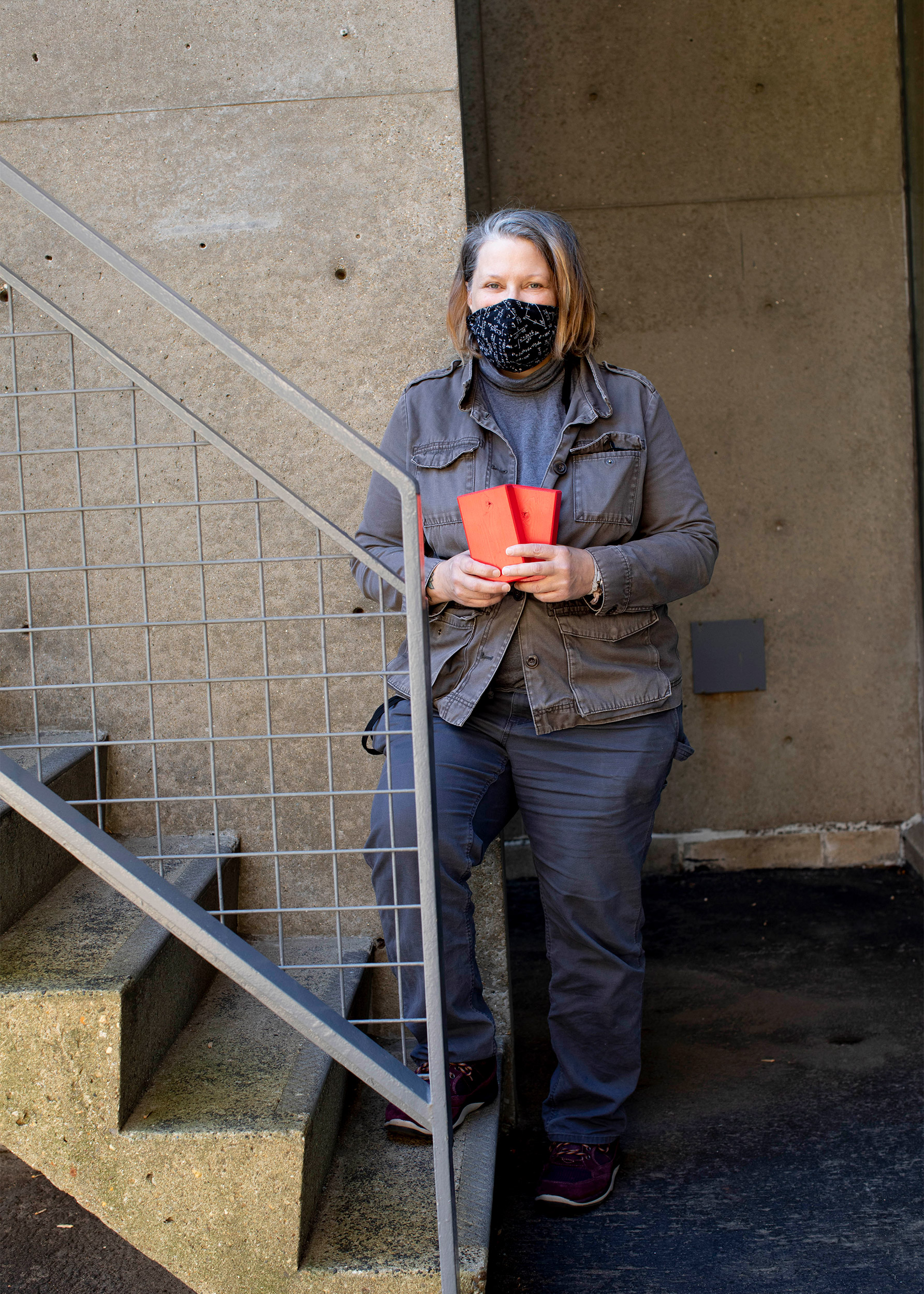
Leon Welch
Purchasing Assistant at HUHS
Here we typically wear many hats, but my primary job is to facilitate getting all the medical supplies that are necessary to run a health clinic. I’m the go-to person for any general and specific medical supplies. If a doctor needs a specific suture or the clinic needs diagnostic equipment, I have to get it. I’ve been here for the entire length of the pandemic because we were designated as essential personnel; the work that we do cannot be done from home. I’ve taken on additional duties: I helped with the setup and break down of testing sites at the stadium, then in the Science Center, and some of the Houses. We provided all the inventory needed for testing.
My biggest challenge still is to make sure I find the supplies we need for the pandemic, such as protective equipment, which became in short supply overnight. I can tell you that even up to this day since March, we have not been able to buy one N-95 mask [standard issue for health-care professionals as it can filter 95 percent of airborne particles]. We have to make sure that we have enough gloves, disposable masks, alcohol wipes, sanitizing wipes, headcovers, etc. They’re like gold now. I spend most of my day talking to vendors, begging people, just to make sure that we can keep the supply here, and we don’t get dangerously low. I’m in constant relationship with doctors and nurses because they depend on us to do their job.
I hope that people follow the right procedures so that the infection rate can go down to the point where more people could come on campus. For all the people who have come into HUHS from March to now, none of our staff has become infected with COVID-19. That speaks very well to the procedures we have set up at HUHS and the teamwork. Everybody’s role has been very important, from the doctors and nurses to the housekeepers and custodians, to make sure that places are clean, and people feel safe going into them.
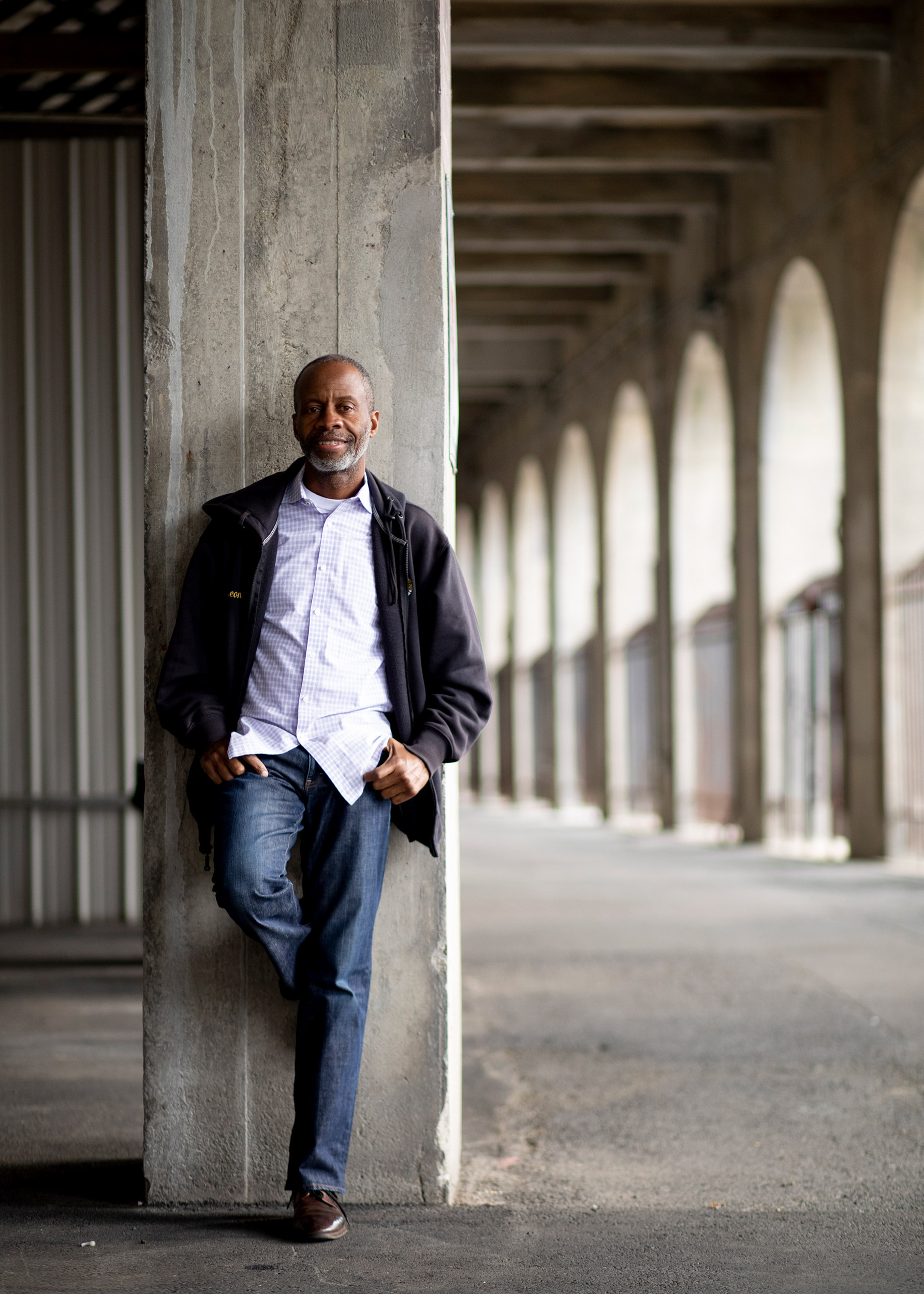
Jesselyn Opie
Administrative Coordinator, Building Operations, Northwest Building, and MCZ Labs
My regular responsibilities include establishing administrative procedures for the Northwest (NW) Building’s operations team. I manage card and key access to the building, the building’s electronic signage system, room scheduling, and the building’s operations accounts and vendor contracts. Northwest is a very mechanically complicated building; we have all kinds of electronic and scientific equipment here. There are 73 lab groups in NW and 11 lab groups at MCZ Labs. About 700 people work here normally, among researchers, faculty, staff, and students.
When Harvard moved in June to reopen its labs, we were tasked with preparing the buildings for reoccupancy in accordance with the guidelines set by the state and the University. It was a huge undertaking initially because within a very short period of time, we had to obtain hand sanitizers, touchless faucets, floor stickers for signage, anything that would prepare the building for folks to come in and use it in a safe way. We had to make modifications in lab spaces; some folks wanted partitions. There was a huge effort to evaluate and adjust the airflow to make sure that the air was healthy. One of the main challenges was obtaining the supplies we needed because everybody in the whole country wanted the same thing. We worked around the clock to make the building ready and safe for folks to come back and start working. A lot of grant-funded research had to be up and running by a certain date to avoid losing funding.
Throughout these past few months, what was most striking was the level of expertise and dedication of my teammates. It was really awesome to see everybody use their skills. I hope that the measures we have taken make a difference in people’s ability to come to work. I feel very safe because everybody follows the guidelines. It’s an environment as safe as can be.
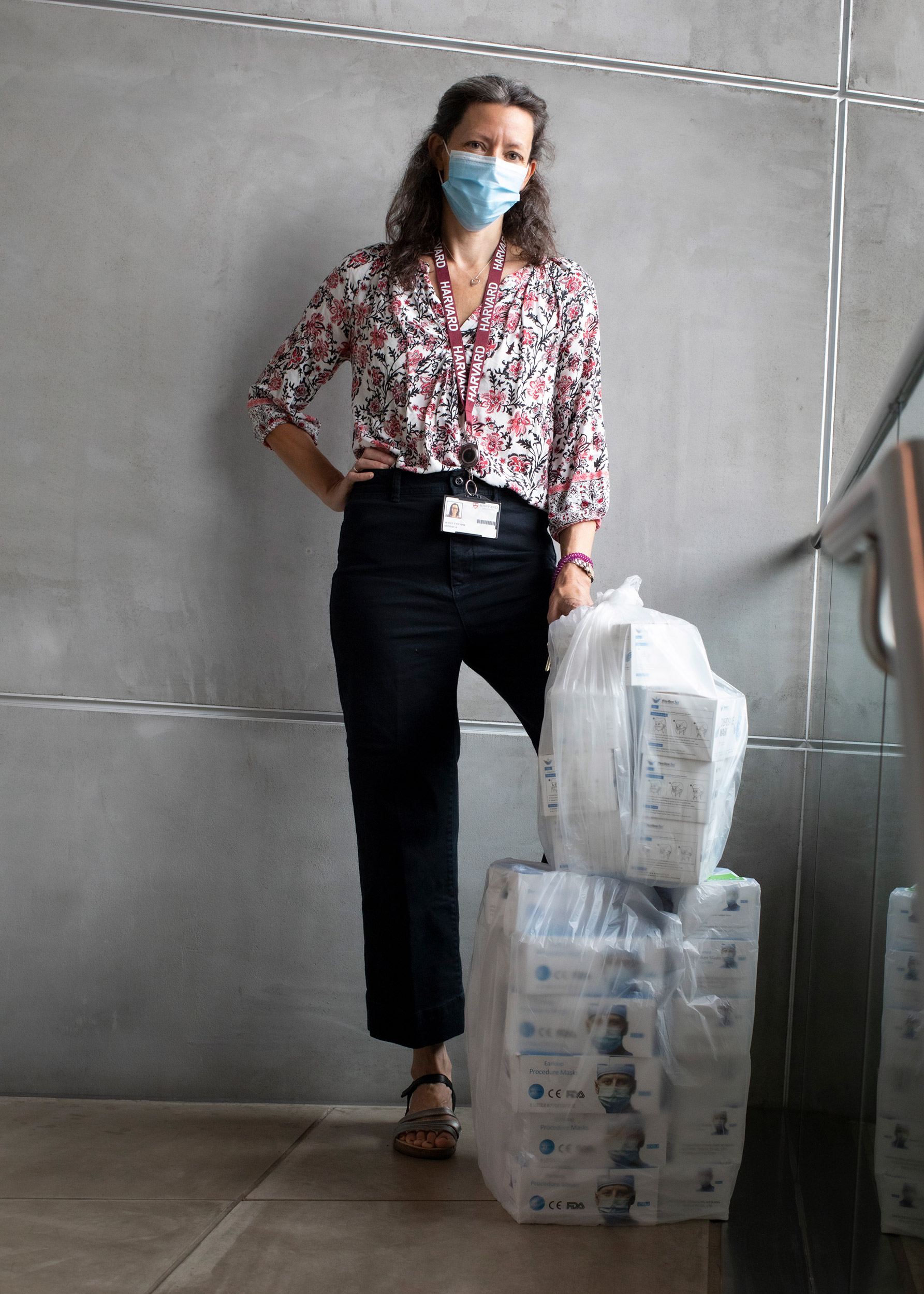
Greg Kousidis
HVAC/Controls Mechanic
In January, I just made 20½ years working at Harvard as an HVAC/controls mechanic. We install and service all types of heating and cooling equipment, but I work primarily on digital control systems. The entire University is controlled by some form of computerized energy management system. Our crew has typically eight to 12 men. We work all over the University, the central campus, the Medical School, the Business School, etc.
The crew is off physically working on campus. We can’t do equipment maintenance over the phone. We follow standards through the American Society of Heating, Refrigerating and Air-Conditioning Engineers (ASHRAE), but due to the pandemic, the University mandated that all buildings have to improve indoor air quality to prevent potential airborne spread of the coronavirus. This meant that we had to increase the fresh air requirement from what would have typically been two to three air changes per hour to six to eight changes per hour. That took a lot of manpower because we had to measure the air that was being pumped into the rooms with special air-flow-measurement equipment. We also had to bump up all the air filters we typically use from MERV 7 to MERV 13. MERV stands for Minimum Efficiency Reporting Value and the filters with higher MERV ratings can trap dust, allergens, and viruses.
The nuts and bolts of our responsibilities haven’t really changed. We had to respond to the immediate demand to improve indoor air quality, and that hasn’t stopped, and there will be increased demands as people get back to work. I hope our lives go back to normal at some point in time. Meanwhile, we’re going to continue to do our job and provide an environment that’s conducive to healthy learning. We are doing our part, with other essential workers, who hold this place together day in and day out.
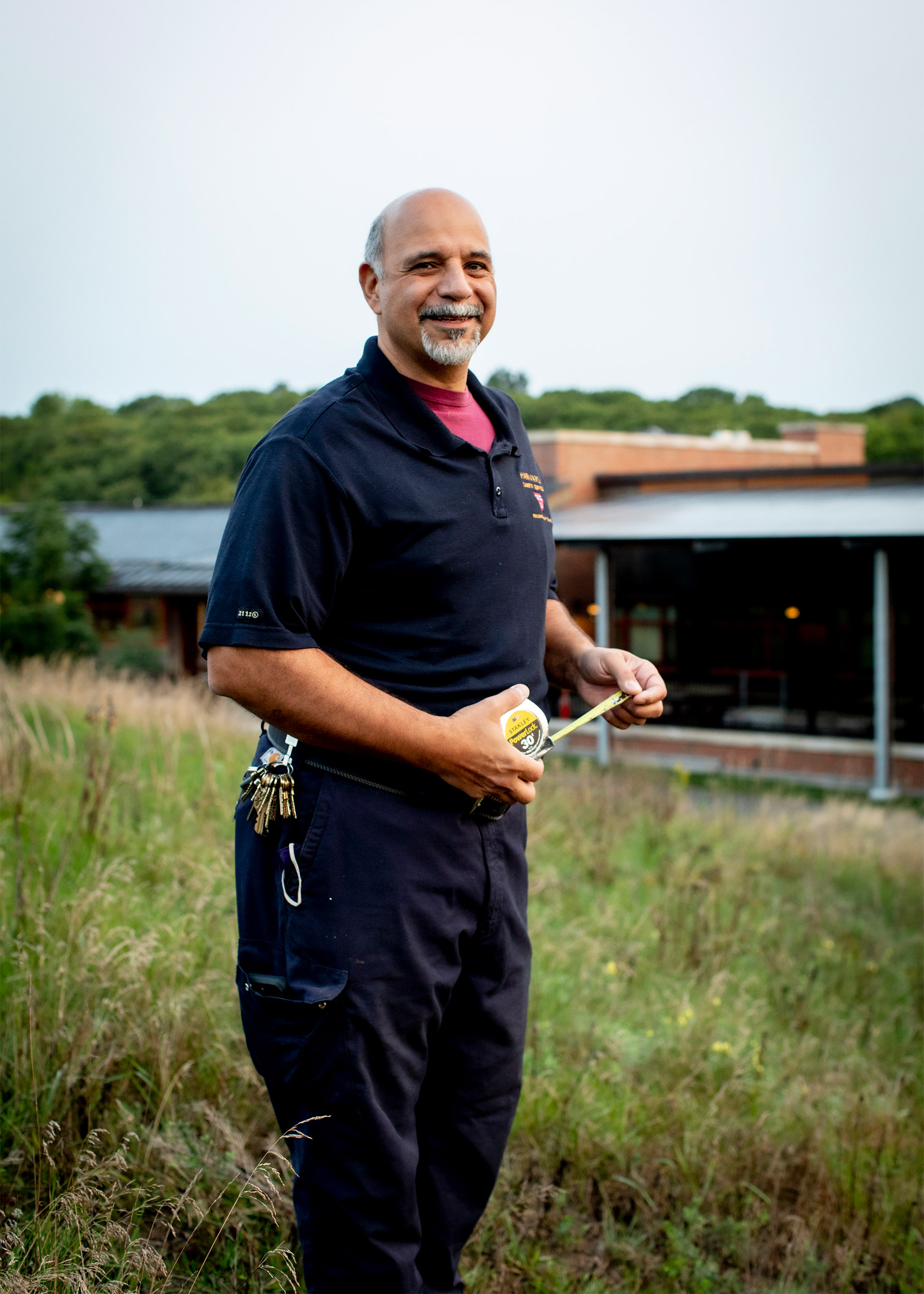
Iyobel Tensae
Delivery Driver
Before the pandemic, my work was to deliver mail to all the libraries and all the Houses as well, including packages from Amazon, USPS, FedEx, etc. We were busy before the pandemic, and we’re busy now, but in a different way.
Our work has taken more of an important role. Half of the team is dedicated to picking up COVID-19 tests from designated drop-off sites across campus. The other half of the team continues to deliver mail to libraries and packages to students. My job is to pick up the COVID-19 tests from 11 sites, take them to the Northwest Labs where they package them, and then take them to the Broad Institute to be processed.
Students are being tested three times a week. We pick up the tests from the sites every hour because students get the results in 24 hours. On a regular day, I deliver between 1,500 and 2,000 tests to the Broad Institute. I end up going to the institute four times a day. We’re pretty busy, but we’re aware that what we’re doing now is critical to make sure everybody is safe and that everybody can get their results in a timely manner.
I’m a hard worker who happily does whatever needs to be done. It’s more hectic than before, but
we are all working hard. We are trying to work to the best of our abilities and follow the University’s guidelines: wearing masks and gloves, washing hands, and using sanitizer. We’re happy to play an important role in the University’s efforts to keep everybody safe. We hope that the COVID-19 rates go down and that we can have a safe campus, and that hopefully students and everybody can come back so we can have a full house again.
